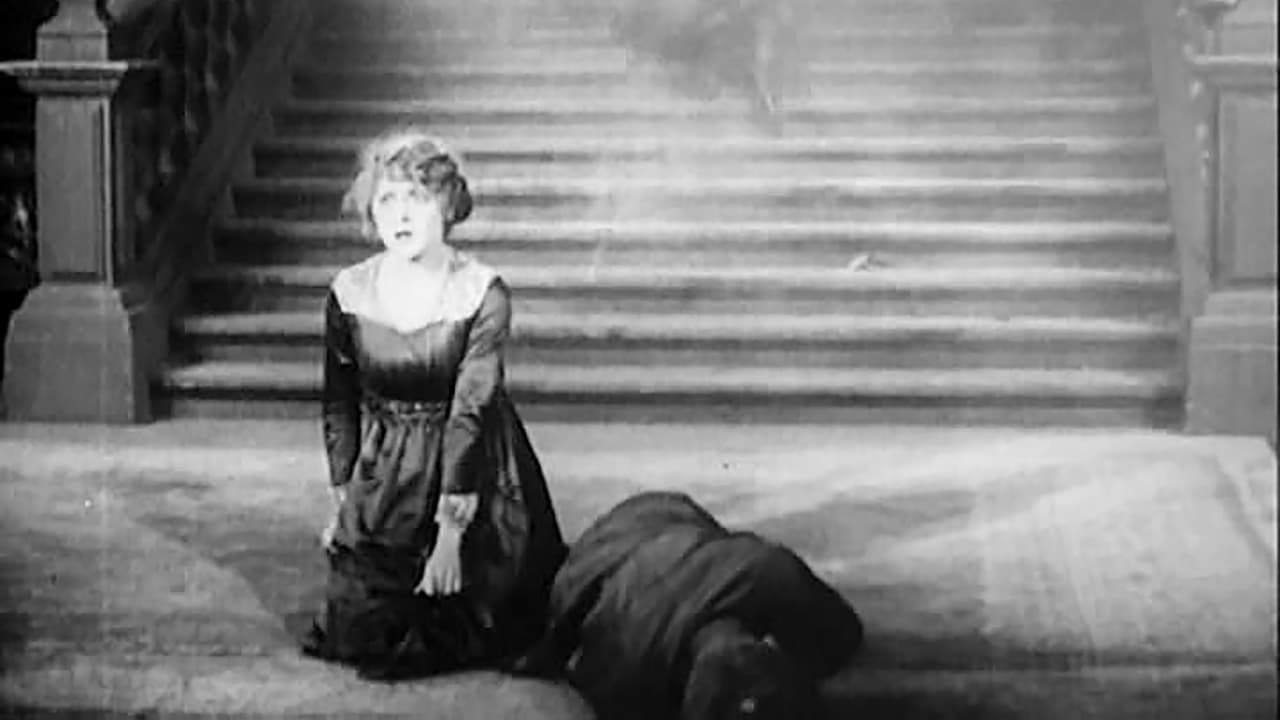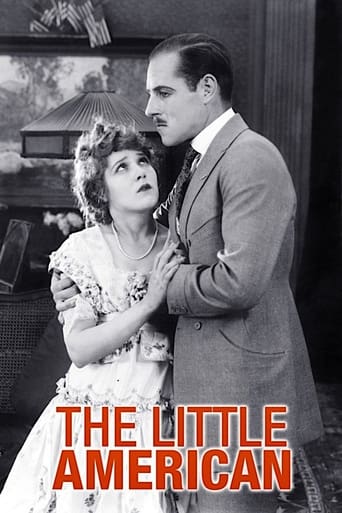

A bit overrated, but still an amazing film
... View MoreIn truth, there is barely enough story here to make a film.
... View MoreEach character in this movie — down to the smallest one — is an individual rather than a type, prone to spontaneous changes of mood and sometimes amusing outbursts of pettiness or ill humor.
... View MoreThe biggest problem with this movie is it’s a little better than you think it might be, which somehow makes it worse. As in, it takes itself a bit too seriously, which makes most of the movie feel kind of dull.
... View MoreCanadian actress Mary Pickford plays lead in "The Little American"--one of the most blatant examples of anti-German propaganda made during WWI.The film begins with Mary being courted by a German guy (Jack Holt). However, before they can marry, he's called back to serve in the German army, as WWI has just begun (incidentally, the US stayed out of the war for more than 2 1/2 years). Shortly after this, Mary is called to France, as a rich relative has requested she come there. On the way, the passenger ship she is on is torpedoed--much like the famous Lusitania case (her ship is called the 'Veritania'--subtle, huh?). It's ridiculous today to see German soldiers (including Holt) toasting to the sinking of a passenger ship, but back in 1917, the public ate this up and believed it to be true (now we know these accounts were fabricated by the British government).Despite her boat being torpedoed, plucky Mary makes it to France where she learns that she's just inherited the Aunt's estate. However, soon the Germans come and attack her in her new home. Despite telling them she's an American (who were at the time Neutral), they attack with the ferocity of hungry dogs going after a pork chop! Now the Germans occupy her home and the Germans ignore her pleas to spare the French civilians. Instead, she's made a virtual slave in her own home--waiting on the Germans as they destroy her home. In one of those coincidences that can only happen in a movie, Holt is naturally there as well but does nothing to help her or her new people. In the meantime, the Germans start executing civilians and behaving horribly.As a result of the German atrocities, Mary feels she has no choice but to aid the French army--directing fire upon her estate. She knows it might mean death for her, but she is now committed to the Allied cause. When she is captured, "America's Sweetheart" (a title bestowed on the actress) is threatened with execution!! At this point, Holt announces he'd rather die with her than serve the accursed Kaiser! But, in a scene once again only found in movies, the two are saved at the instant before the Germans open fire on them!! The final scenes show the Germans reducing a church to rubble all around a lone crucifix! Wow, subtle it ain't!! At the time this was made, I am sure it was super-effective in galvanizing people behind the Allied war effort. Even though in 1916 almost all Americans were in favor of continued neutrality, by April 1917 (when the US entered the war), Americans went war-crazy--eating up films like this, growing Victory Gardens, volunteering to fight, beating up German-Americans and getting jobs in munitions plants. All this for a war that had no real good guys or bad guys--just millions and millions dead. Because this movie made this seem GOOD, it left me a bit unsettled. However, it is well made and effective.
... View MoreLittle American, The (1917) ** 1/2 (out of 4) Cecil B. DeMille would eventually become known for his over the top films but I guess you can follow this type of film-making back to 1917 and this picture. The film starts off in America where Angela Moore (Mary Pickford) is being courted by both a German (Jack Holt) and a Frenchman (Raymond Hatton). When WW1 breaks out both men head off to fight for their different countries and soon Mary, now in France, comes under attack by German troops and Holt will have to decide to save her or stand up for his evil country. This film is so over the top in its patriotism that at times it becomes quite laughable. At the start of the film, when Pickford's character is introduced, we learn that she was born on the Fourth of July. When we first see her there's a big American flag waving behind her as she gives that lovely smile towards the camera. Overall this film is a mixed bag full of some great stuff but also containing a lot of weak stuff. The good stuff includes a strong performance by both Pickford and Holt who settle into their roles quite well. Apparently Pickford hated working for DeMille but that doesn't really show as she delivers her strong performance. The battle scenes, for the most part, are pretty good as well. The most interesting aspect of the film is how they show the evils being done by the German's at the time and this includes showing them raping some women as well as killing elderly men. The weak stuff is all the propaganda running throughout the film. I know this was common for the day but this film takes it to a whole new level. Another silly sequence is when Pickford's U-Boat is hit by a German torpedo. The special effects here are so bad that you can tell the boat seems to be a plastic one floating in a tub. The scenes towards the end where Pickford runs into Jesus on the cross doesn't contain the magic that DeMille was going for either. In the end, this is a mixed bag but fans of DeMille and Pickford would probably want to check it out but D.W. Griffith's Hearts of the World is much better.
... View More(SPOILERS IN FIRST PARAGRAPH) This movie's anti-German sentiment seems painfully dated now, but it's a brilliant example of great war-time propaganda. It was made back when Cecil B. DeMille was still a great director. (Ignore all his later Best Picture Academy Awards; he never made a very good sound film.) This movie lacks the comedy of most of Pickford's other films, and really it was DeMille's movie, not Pickford's. The vilification of the Germans can be compared to the way "The Patriot" of 2000 did the same to the British. The only good German in the film was a reluctant villain who had the ironic name of Austreheim. They even had Pickford take an ill-fated trip on a luxury ship that gets torpedoed by a German submarine. So what'll get the Americans more stirred up to war? The sinking of the Lusitania, or watching America's favorite Canadian import sinking in it? All throughout the film DeMille runs his protagonist from one kind of horrible calamity to another, barely escaping death, hypothermia, depravity, rape, execution, and explosions that go off in just the right place to keep her unharmed. The way she is saved from a firing squad is no more believable than the way the humans in "Jurassic Park" were ultimately rescued from the velociraptors. If I was any more gullible to such propaganda I would punish myself for having a part-German ancestry. Was it a good film? Aside from a humorous running gag about Americans abroad thinking they're untouchable that was apparently a joke even back then you might not be entertained. You'll find it more than a little melodramatic, and obviously one-sided, but the first thing that came to my mind after watching it is that it was years before Potemkin's false portrayal of a massacre revolutionized the language of cinema as well as a movie's potential for propaganda. It made me wonder: what became of Cecil B. DeMille? Somewhere between the advent of sound and "The Greatest Show on Earth" he seemed to lose his ambition. Ben Hur looked expensive, but not ambitious. In a sentence, this movie is for 1) Film historians, 2) Silent Film Buffs, 3) Mary Pickford fans, or 4) DeMille fans, if such a person exists.
... View MoreIn its own time, this effective and often compelling wartime melodrama used the talents of Mary Pickford and a young Cecil B. DeMille in support of the Allies in the first world war. It works well in itself, and it might be even more worthwhile now, for a generation that can view the events of that era more impartially, in order to draw some broader lessons from it.Pickford plays Angela, "The Little American", a young woman courted by a German and a Frenchman who are both living in America. This familiar setup soon becomes much more serious when the war breaks out, and the two young men return to Europe and the battlefield, with Pickford's character soon joining them in the midst of the turmoil and terror of the conflict. The ensuing story occasionally has some points in common with the Valentino/Rex Ingram classic "The Four Horsemen of the Apocalypse", though with a generally more hopeful tone.The first half has a particularly excellent sequence that depicts a submarine attacking a passenger liner. It works very well both dramatically and thematically. In particular, the light and motion of the sub's searchlight darting erratically through the darkness, so that its crew can survey the results of their attack, produces a chilling effect that is probably more effective than any amount of screaming could have been. The sequence works convincingly in portraying the barbarous, inhuman nature of attacks on civilian targets, and it also demonstrates the emptiness of the excuses used to justify them.That is probably the strongest sequence, but the main story in the château also has some worthwhile material. The German soldiers are largely portrayed as subhuman, but this is balanced to a large degree by the character of Karl (Jack Holt) and his inner struggle between his sense of duty and his sense of justice. Holt and Pickford work well together, and Raymond Hatton, though not getting as much screen time, also makes good use of his opportunities.With the delightful Pickford as the star, and DeMille already showing his ability to film set pieces effectively, this must have been very persuasive in its original purpose of strengthening support for the Allied cause. But now it can serve a different, and possibly more important, purpose. The harrowing experiences of Angela and the other characters are effective in demonstrating how quickly the fabric of human society can tear apart when military victory becomes all-important. While less ambitious and less well-known than the best-known of the classic movies that came out of the first world war, "The Little American" works well, and it is well worth the time to watch.
... View More